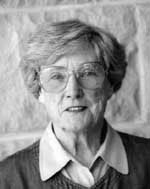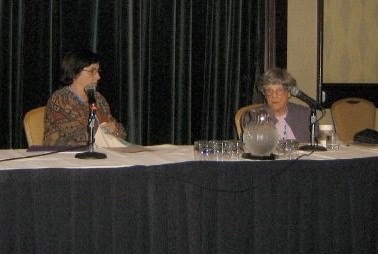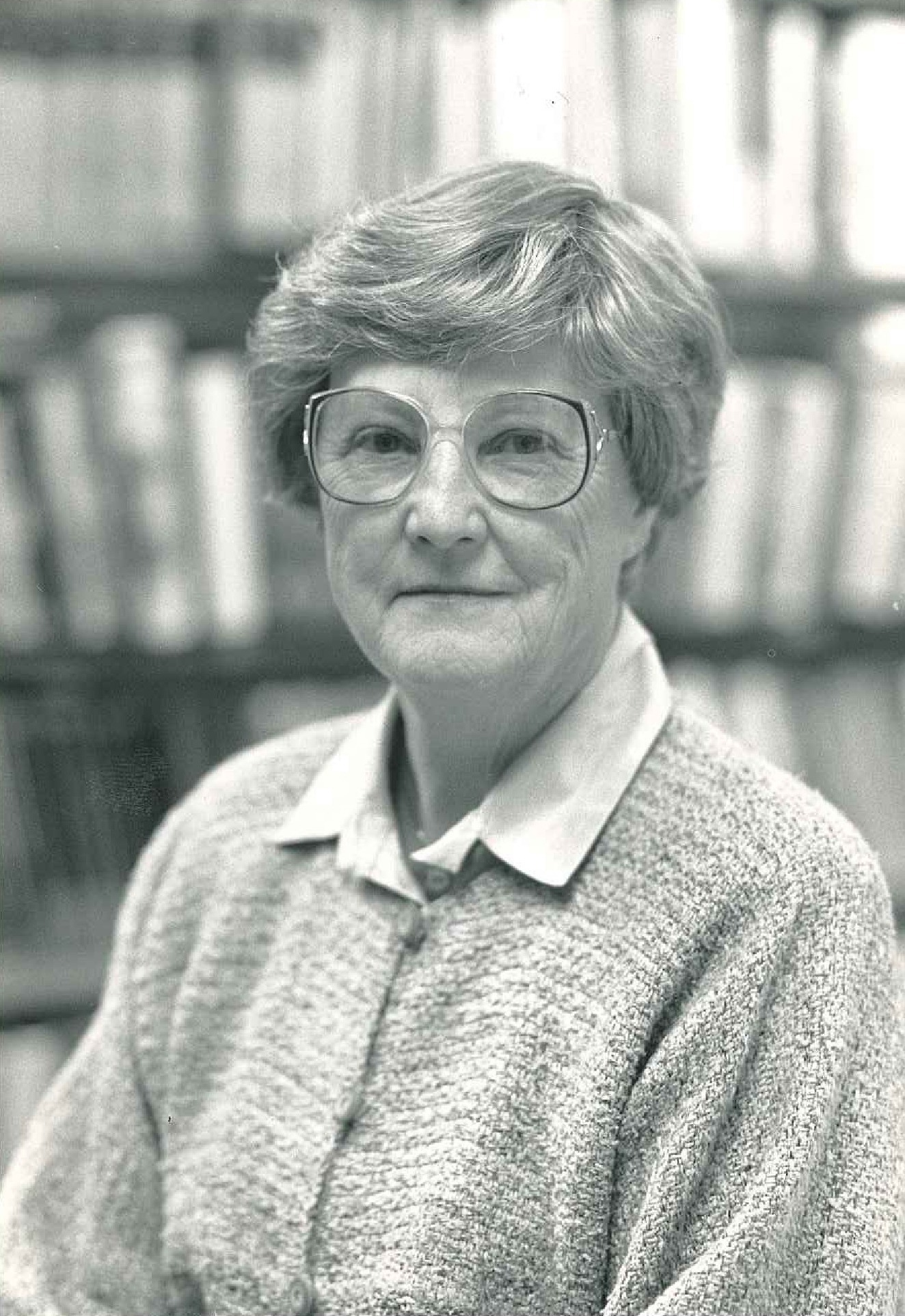Profile

Eleanor Maccoby
Birth:
1917
Death:
2018
Training Location(s):
PhD, University of Michigan (1950)
MA, University of Michigan (1949)
BA, University of Washington (1939)
Primary Affiliation(s):
Stanford University (1958-present)
Harvard University (1950-1957)
Psychology’s Feminist Voices Oral History Interview:
Other Media:
Curriculum Vitae
Eleanor Maccoby, Curriculum Vitae, Societry for Research in Child Development
Interviews
Eleanor Maccoby, Society for Research in Child Development Oral History Transcript
Reminiscences of Eleanor Maccoby: Oral History, 1985
Stanford Pioneering Women I: A Conversation with Women Hired Between 1958 and 1975
Website
Eleanor Maccoby in the history of Harvard University
Video
Inside the Psychologist's Studio: Eleanor Maccoby talks Developmental Psychology, Gender Studies
Career Focus:
Sex differences; gender development; gender differentiation; parent-child relations; child development; personality and social development.
Biography
Eleanor Emmons was born on May 15, 1917 in Tacoma, Washington. In 1950, she completed her PhD in psychology at the University of Michigan. After graduating, she took on a position at Harvard University. However, after a few years, Eleanor and her husband, Nathan Maccoby, were offered positions at Stanford University. Due to anti-nepotism rules, Nathan took a job in the Communications Department, while Eleanor took a position in Psychology, where she was asked to fill Lois Meek Stolz's position teaching child psychology. She was pleased with her offer, and since it was part-time, it allowed her to split her time between work and her newly adopted children.
Maccoby has always felt that she is a feminist but that feminist issues have not always been in the forefront of her thinking. She recalls experiencing very little sexism in her early career. However, feminist concerns became more salient to her during the student protests of the Vietnam War. A group of student protesters publicly announced the salaries of faculty members, showing her to be one of the lowest paid faculty on campus. Feminist concerns then began to resurface in a hurry. However, this resurgent feminist consciousness was not yet fully realized - it still required some development. Some of her growth occurred through her participation in sexual harassment issues on campus. However, much of this development occurred through working with her post-doctoral student, Carol Jacklin. Maccoby reports that "she was much more intensely feminist than I was" at the time.
As Maccoby and Jacklin worked together on a parent-child interaction project, they became increasingly disgruntled about the psychological literature they were reading on the differences between men and women. "Now I remember particularly when I read a clinical psychologist, Freudian, who published this business of the sensual difference between the sexes, is that men are - males are active and females are passive. I said 'passive!' What in the world could anybody mean?" They decided to do a systematic review of the literature on gender differences. However, as they read, they realized that they knew of many colleagues who had looked for gender differences whose work was either absent from the literature, or their analyses were not included in the final manuscripts. In asking around, they found that most of these studies had found no gender differences, but the researchers had been unable to publish these findings. "And this turned out to be a huge source of bias in the literature because, there was one study, let me think, yes, it was on the prisoner's dilemma, and women were said to sell out their partners more often than men would. There had been almost 30 replications..that found no difference, and they didn't publish it." In the end, Maccoby and Jacklin decided to include as many unpublished studies as they could find in order to try and contend with this publication bias. The result of their systematic review was published in 1974 as the book The Psychology of Sex Differences. As Maccoby recalls, "And as you know the upshot of that book - its basic message was - most of what we think about as differences, essential differences between the sexes are myths! They aren't true!" The message got a warm reception, as feminist scholars at the time were very concerned with showing how similar men and women really are. The book became an instant classic, now with well over 5000 citations.
While working on The Psychology of Sex Differences, Maccoby and Jacklin also embarked on a longitudinal study of gender development and differentiation in children. This project resulted in the 1980 book Social Development. At that time, Maccoby became interested in whether gender differentiation occurred in similar patterns across cultures. All her readings in anthropology suggested that it might. So, in her final book on the topic, The Two Sexes: Growing Up Apart, Coming Together (1998), Maccoby suggested that biological factors could have some role to play in the development and expression of gender. Her observations had led her to conclude that socialization couldn't be solely responsible for the behaviours of the children in her study. "So I began to be fairly skeptical about the idea that this was being produced by socialization, and that too was really against the zeitgeist of feminist thinking I think. I don't know where I stand with them [feminist scholars] now to tell you the truth."
Maccoby has been recognized in several ways for her contributions to psychological knowledge and the discipline itself. She was the first woman to serve as Chair of the Psychology Department at Stanford (1973-1976). She was elected president of the Western Psychological Association, and the American Psychological Association's (APA) division of Developmental Psychology (Division 7). In addition, Maccoby has received numerous awards, including Distinguished Contribution awards from the Society for Research on Child Development and the American Psychological Association. She was also awarded the Lifetime Contribution award from the American Psychological Foundation in 1997.
In 2000, Maccoby was afforded a rare honor - she became the first recipient of an award named after her. Division 7 of the APA now gives the Eleanor Maccoby Book Award to an individual who has written a book that has profoundly shaped the course of developmental psychology. At the age of 101, Dr. Eleanor Emmons Maccoby died of pneumonia in Palo Alto California on December 11th. 2018.
by Laura Ball (2011) updated by Kelli Vaughn-Johnson (2018)
To cite this article, see Credits
Selected Works
By Eleanor Maccoby
Maccoby, E. E. (1998). The two sexes: Growing up apart, coming together. Cambridge, MA: Harvard University Press.
Maccoby, E. E. (1988). Gender as a social category. Developmental Psychology, 24, 755-765.
Maccoby, E. E. (1980). Social development: Psychological growth and the parent-child relationship. New York, NY: Harcourt Brace.
Maccoby, E. E., & Jacklin, C. N. (1974). The psychology of sex differences. Palo Alto, CA: Stanford University Press.
Maccoby, E. E., Newcomb, T. R., & Hartley, E. (Eds.).(1958). Readings in social psychology. New York: Henry Holt.
Sears, R. R., Maccoby, E. E., & Levin, H. (1957). Patterns of child-rearing. Evanston, IL: Row-Peterson.
About Eleanor Maccoby
Maccoby, E. E. (1989). Eleanor E. Maccoby. In G. Lindzey (Ed.), A history of psychology in autobiography (Vol. 8, pp. 290-335). Stanford, CA: Stanford University Press.
O'Connell, A. N. (1990). Eleanor Emmons Maccoby (1917-). In A. N. O'Connell & N. F. Russo (Eds.), Women in psychology: A bio-bibliographic sourcebook (pp. 230-237). Westport, CT: Greenwood Press.
Stevens, G. & Gardner, S. (1982). The women of psychology, Vol. 2: Expansion and refinement (pp. 219-220). Cambridge, MA: Schenkman.
Photo Gallery






Eleanor Maccoby
Birth:
1917
Death:
2018
Training Location(s):
PhD, University of Michigan (1950)
MA, University of Michigan (1949)
BA, University of Washington (1939)
Primary Affiliation(s):
Stanford University (1958-present)
Harvard University (1950-1957)
Psychology’s Feminist Voices Oral History Interview:
Other Media:
Curriculum Vitae
Eleanor Maccoby, Curriculum Vitae, Societry for Research in Child Development
Interviews
Eleanor Maccoby, Society for Research in Child Development Oral History Transcript
Reminiscences of Eleanor Maccoby: Oral History, 1985
Stanford Pioneering Women I: A Conversation with Women Hired Between 1958 and 1975
Website
Eleanor Maccoby in the history of Harvard University
Video
Inside the Psychologist's Studio: Eleanor Maccoby talks Developmental Psychology, Gender Studies
Career Focus:
Sex differences; gender development; gender differentiation; parent-child relations; child development; personality and social development.
Biography
Eleanor Emmons was born on May 15, 1917 in Tacoma, Washington. In 1950, she completed her PhD in psychology at the University of Michigan. After graduating, she took on a position at Harvard University. However, after a few years, Eleanor and her husband, Nathan Maccoby, were offered positions at Stanford University. Due to anti-nepotism rules, Nathan took a job in the Communications Department, while Eleanor took a position in Psychology, where she was asked to fill Lois Meek Stolz's position teaching child psychology. She was pleased with her offer, and since it was part-time, it allowed her to split her time between work and her newly adopted children.
Maccoby has always felt that she is a feminist but that feminist issues have not always been in the forefront of her thinking. She recalls experiencing very little sexism in her early career. However, feminist concerns became more salient to her during the student protests of the Vietnam War. A group of student protesters publicly announced the salaries of faculty members, showing her to be one of the lowest paid faculty on campus. Feminist concerns then began to resurface in a hurry. However, this resurgent feminist consciousness was not yet fully realized - it still required some development. Some of her growth occurred through her participation in sexual harassment issues on campus. However, much of this development occurred through working with her post-doctoral student, Carol Jacklin. Maccoby reports that "she was much more intensely feminist than I was" at the time.
As Maccoby and Jacklin worked together on a parent-child interaction project, they became increasingly disgruntled about the psychological literature they were reading on the differences between men and women. "Now I remember particularly when I read a clinical psychologist, Freudian, who published this business of the sensual difference between the sexes, is that men are - males are active and females are passive. I said 'passive!' What in the world could anybody mean?" They decided to do a systematic review of the literature on gender differences. However, as they read, they realized that they knew of many colleagues who had looked for gender differences whose work was either absent from the literature, or their analyses were not included in the final manuscripts. In asking around, they found that most of these studies had found no gender differences, but the researchers had been unable to publish these findings. "And this turned out to be a huge source of bias in the literature because, there was one study, let me think, yes, it was on the prisoner's dilemma, and women were said to sell out their partners more often than men would. There had been almost 30 replications..that found no difference, and they didn't publish it." In the end, Maccoby and Jacklin decided to include as many unpublished studies as they could find in order to try and contend with this publication bias. The result of their systematic review was published in 1974 as the book The Psychology of Sex Differences. As Maccoby recalls, "And as you know the upshot of that book - its basic message was - most of what we think about as differences, essential differences between the sexes are myths! They aren't true!" The message got a warm reception, as feminist scholars at the time were very concerned with showing how similar men and women really are. The book became an instant classic, now with well over 5000 citations.
While working on The Psychology of Sex Differences, Maccoby and Jacklin also embarked on a longitudinal study of gender development and differentiation in children. This project resulted in the 1980 book Social Development. At that time, Maccoby became interested in whether gender differentiation occurred in similar patterns across cultures. All her readings in anthropology suggested that it might. So, in her final book on the topic, The Two Sexes: Growing Up Apart, Coming Together (1998), Maccoby suggested that biological factors could have some role to play in the development and expression of gender. Her observations had led her to conclude that socialization couldn't be solely responsible for the behaviours of the children in her study. "So I began to be fairly skeptical about the idea that this was being produced by socialization, and that too was really against the zeitgeist of feminist thinking I think. I don't know where I stand with them [feminist scholars] now to tell you the truth."
Maccoby has been recognized in several ways for her contributions to psychological knowledge and the discipline itself. She was the first woman to serve as Chair of the Psychology Department at Stanford (1973-1976). She was elected president of the Western Psychological Association, and the American Psychological Association's (APA) division of Developmental Psychology (Division 7). In addition, Maccoby has received numerous awards, including Distinguished Contribution awards from the Society for Research on Child Development and the American Psychological Association. She was also awarded the Lifetime Contribution award from the American Psychological Foundation in 1997.
In 2000, Maccoby was afforded a rare honor - she became the first recipient of an award named after her. Division 7 of the APA now gives the Eleanor Maccoby Book Award to an individual who has written a book that has profoundly shaped the course of developmental psychology. At the age of 101, Dr. Eleanor Emmons Maccoby died of pneumonia in Palo Alto California on December 11th. 2018.
by Laura Ball (2011) updated by Kelli Vaughn-Johnson (2018)
To cite this article, see Credits
Selected Works
By Eleanor Maccoby
Maccoby, E. E. (1998). The two sexes: Growing up apart, coming together. Cambridge, MA: Harvard University Press.
Maccoby, E. E. (1988). Gender as a social category. Developmental Psychology, 24, 755-765.
Maccoby, E. E. (1980). Social development: Psychological growth and the parent-child relationship. New York, NY: Harcourt Brace.
Maccoby, E. E., & Jacklin, C. N. (1974). The psychology of sex differences. Palo Alto, CA: Stanford University Press.
Maccoby, E. E., Newcomb, T. R., & Hartley, E. (Eds.).(1958). Readings in social psychology. New York: Henry Holt.
Sears, R. R., Maccoby, E. E., & Levin, H. (1957). Patterns of child-rearing. Evanston, IL: Row-Peterson.
About Eleanor Maccoby
Maccoby, E. E. (1989). Eleanor E. Maccoby. In G. Lindzey (Ed.), A history of psychology in autobiography (Vol. 8, pp. 290-335). Stanford, CA: Stanford University Press.
O'Connell, A. N. (1990). Eleanor Emmons Maccoby (1917-). In A. N. O'Connell & N. F. Russo (Eds.), Women in psychology: A bio-bibliographic sourcebook (pp. 230-237). Westport, CT: Greenwood Press.
Stevens, G. & Gardner, S. (1982). The women of psychology, Vol. 2: Expansion and refinement (pp. 219-220). Cambridge, MA: Schenkman.





